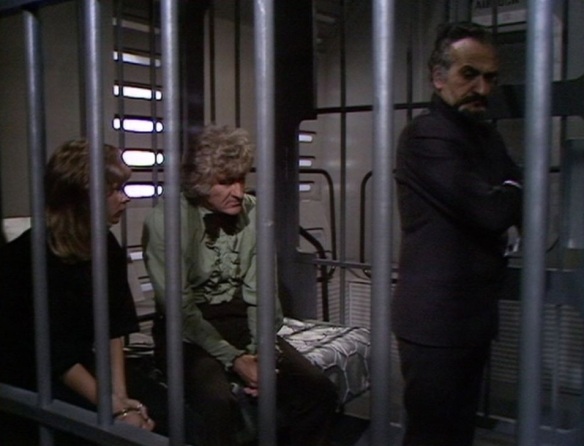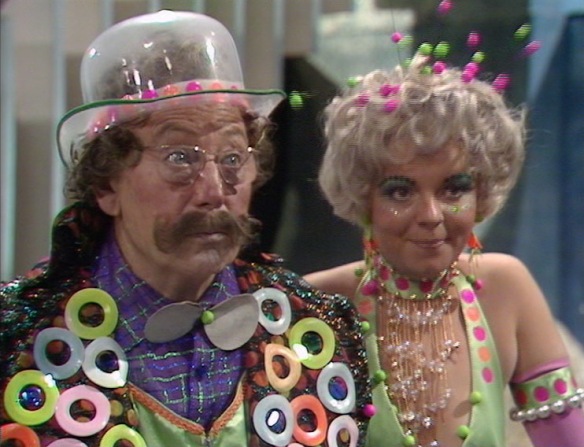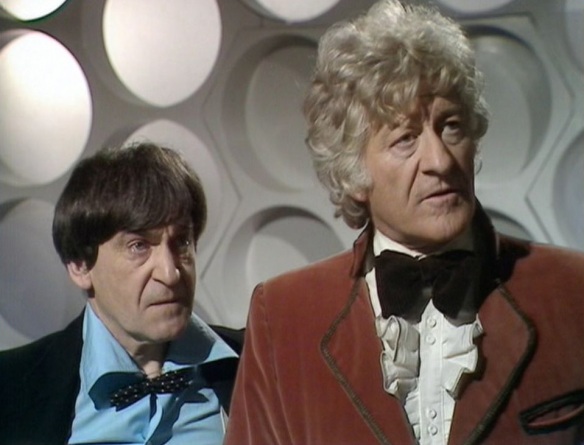
I cried, as I thought I might do. That’s got to be one of the most heartbreaking companion departures in the show’s history. The closing scenes are sheer joyful agony, with the Doctor devastated by his imminent loss despite knowing that it’s for the best, just like when it was his own flesh and blood. The giant leap from first meeting to marriage proposal was also very similar, but you can easily forgive that thanks to the beautiful way this story is constructed.
It’s got an elegant structure to it, and as a result it zips by, quickly establishing the situation in episode one by intercutting between the various factions involved, in order to get on with moving the plot forward without ever overwhelming the audience with information. That this is further intercut with the Doctor’s hilariously nightmarish trip to Metebelis III is the icing on the cake.
Meanwhile, Professor Jones is subtly being set up to be a young, human, sexy, Welsh version of The Doctor, which is solidified with the brilliant back reference to Jo being someone who can hand you test tubes and tell you how brilliant you are. By the end, she’s pulling favours for the Prof just like she did to meet the Doc, and she’s off to go adventuring in exotic locales in the name of science. This era of Doctor Who really knows what it’s doing, and it certainly doesn’t feel like it’s over forty years old – this is just great television.
Elsewhere, it’s lovely to have the Brig back after a relatively long absence – like slipping on a comfortable dressing gown, making you feel at home. And I see Yates is still alive and well after all, and he’s finally becoming useful and vaguely interesting. Despite only turning up halfway through, this was his best story yet, with his undercover shenanigans giving him the chance to do some very Doctorish things. And did I detect a little moment of heartache when Jo announced her engagement to another man?
Pertwee was on great form too, not only with the emotional goodbyes, but also getting a chance to do a bit of comedy. It’s surprising that the Third Doctor is so serious most of the time, given the actor’s Navy Lark heritage and future Worzel Gummidge infamy. But it’s great to see the Doctor’s penchant for disguise return, and he’s outstanding as both the milkman and, in particular, the cleaning lady.
And speaking of campness, BOSS is a bit flamboyant for a computer, isn’t he? Increasingly so throughout the serial, and he becomes all the better for it. His giddy singing and child-like distrait in the last episode is brilliant, and also a stark contrast to the visceral, creepy threat of the maggoty mine scenes that dominate the early episodes. This serial really does have everything, and it does everything well.
Well, almost everything. It’s a shame about the big papier mâché wasp, and the Welsh accents definitely aren’t as convincing as the ones in New Who. But who cares when there’s so many other brilliant little moments – the deeply disturbing but brilliantly underplayed suicide machine, the touching generation-spanning friendship between Jo and Bert, and of course The Doctor cock-blocking Professor Jones when he tried to seduce Jo in front of a log fire.
The CSO doesn’t always work, and it was especially weird when they were cutting between filmed locations and video-taped mock-ups within the same scene – I wonder whether they ran out of time on location, or whether these scenes were extended in the studio to pad out the running time? But despite how poor the effects look by today’s standards, I still always see them as a huge tick in an episode’s plus column. For a start, they wouldn’t have looked nearly as bad on a tiny CRT in the early seventies, plus they show incredible ambition and ingenuity; the production team utilising new technology in the pursuit of telling as big and impressive a story as possible. Coupled with great performances and brilliant writing, this is a golden age.
RATING: 10
Season 10 ends with a 10 out of 10. Milestone time!
SEASON AVERAGE RATING: 8.8
- Seasons/Series watched: 10 of 34 and two thirds
- Stories watched: 69 of 257
- Individual episodes watched: 355 of 821
That’s the highest average rating so far – the extra special tenth anniversary season very much living up to its promise. I’m now past half way through the classic era in terms of episode count, and this makes me slightly sad. But on the other hand, I can’t wait to have witnessed all the brilliance that’s still to come, starting with the first appearance of possibly the only companion who seems worthy of following Jo Grant…




